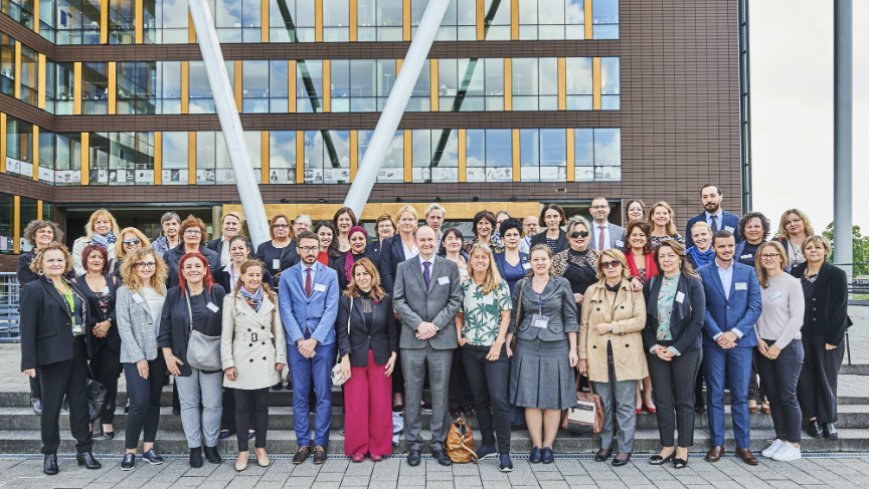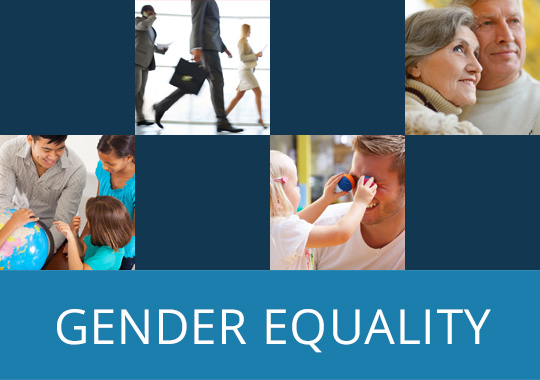Gender Equality Commission

The Gender Equality Commission (GEC) was established to help ensure the mainstreaming of gender equality into all Council of Europe policies and to bridge the gap between commitments made at international level and the reality of women in Europe. The Commission, whose members are appointed by member states, provides advice, guidance and support to other Council of Europe bodies and to member states. The Gender Equality Commission supports the implementation of the six objectives of the Council of Europe Gender Equality Strategy 2018-2023.
 Members of the Gender Equality Commission
Members of the Gender Equality Commission
 Work Plan
Work Plan
 Plenary Meetings
Plenary Meetings
 Bureau meetings
Bureau meetings
 Working Group on the place of men and boys in gender equality policies and in policies to combat violence against women
Working Group on the place of men and boys in gender equality policies and in policies to combat violence against women
 Drafting Committee on Migrant Women
Drafting Committee on Migrant Women
 Drafting Committee on Combating Sexism
Drafting Committee on Combating Sexism
Main tasks of the Gender Equality Commission
Under the authority of the Committee of Ministers, building on the achievements in the area of gender equality, including notably the Council of Europe Gender Equality Strategy 2018-2023, the Gender Equality Commission (GEC) will steer the Council of Europe’s intergovernmental work in the field of gender equality and advise the Committee of Ministers on appropriate action to be taken in its field of competence, taking due account of relevant transversal perspectives. In particular, the GEC is instructed to:
- ensure the follow-up of the relevant decisions taken at the 131st Session of the Committee of Ministers (Hamburg, 21 May 2021), and in particular contribute to the implementation of the key strategic priorities relating to its specific field of expertise as identified in the Strategic Framework of the Council of Europe, and respond to the respective key findings and challenges set out in the Secretary General’s 2021 Report on the state of democracy, human rights and rule of law “A democratic renewal for Europe”;
- oversee and support the implementation of the Council of Europe Gender Equality Strategy (2018-2023), prepare the Gender Equality Strategy (2024-2029), oversee and support its implementation;
- carry out substantive legal and policy analyses and hold peer exchanges on trends, developments and good practices in the member States, including on the basis of the findings of monitoring mechanisms;
- conduct needs assessments and make proposals for the development of common policy responses, including standardsetting activities, to key challenges for member States within its field of competence;
- promote in the political agendas of the Council of Europe member States and beyond the need to prevent and combat all forms of violence against women, including trafficking in persons which disproportionately affects women and girls, and of domestic violence;
- promote and facilitate awareness raising of Council of Europe standards in the field of gender equality and review the implementation of relevant recommendations and guidelines of the Committee of Ministers to member States, including on preventing and combating sexism, in co-operation, where appropriate, with other sectors;
- follow and support relevant co-operation programmes with Council of Europe member States and beyond and, where appropriate, facilitate the dissemination of their results;
- promote gender equality as a visible priority for the Organisation (internally and externally) and, to this end, support the committees and bodies of the Organisation in integrating and implementing gender mainstreaming in their activities;
- engage in co-ordination and joint planning at regional and international level with the European Union, including the European Institute for Gender Equality (EIGE) and the Fundamental Rights Agency (FRA), the UN, in particular UN Women, the World Bank, the OAS, the OSCE, the OECD, other intergovernmental organisations and civil society with the aim of strengthening equality and enhancing women’s rights as an integral part of universal human rights; promote the visibility of the Council of Europe’s standards at these levels through participation in meetings at the level of the UN Commission on the Status of Women, the Committee on the Elimination of Discrimination against Women and the Human Rights Council;
- contribute to the work on a possible legal framework for artificial intelligence (AI) systems and, jointly with the Steering Committee on Anti-discrimination, Diversity and Inclusion (CDADI), subject to the result of a prior study, develop in close co-operation with CAI a possible specific legal instrument on the impact of artificial intelligence systems, their potential for promoting equality, including gender equality, and the risks they may cause in relation to non-discrimination;
- orient and oversee the activities carried out by its subordinate bodies, notably the Committee of Experts on Artificial Intelligence, Equality and Discrimination (GEC/ADI-AI), jointly with CDADI;
- hold an exchange of views annually in order to evaluate its activities and advise the Committee of Ministers and the Secretary General on future priorities in its sector, including possible new activities and those that might be discontinued;
- take due account of the following mainstreamed perspectives in the performance of its tasks: youth, children’s rights, rights of persons with disabilities, and Roma and Traveller issues;
- where relevant, contribute to building cohesive societies and to strengthening the role and meaningful participation of civil society in its work;
- in accordance with decisions CM/Del/Dec(2013)1168/10.2 of the Committee of Ministers, carry out, at regular intervals, within the limits of the available resources and bearing in mind its priorities, an examination of some or all of the conventions for which it has been given responsibility, in co-operation, where appropriate, with the relevant convention-based bodies, and report back to the Committee of Ministers;
- contribute to the achievement of, and review progress towards, the UN 2030 Agenda for Sustainable Development, in particular with regards to Goal 5: Gender Equality and Goal 16: Peace, Justice and Strong institutions.
 Terms of reference 2022-2025
Terms of reference 2022-2025
 Terms of reference 2020-2021
Terms of reference 2020-2021
 Terms of reference of the Drafting Committee on migrant women 2020-2021
Terms of reference of the Drafting Committee on migrant women 2020-2021
 Terms of reference of the Drafting Commitee to prevent and combat sexism 2018-2019
Terms of reference of the Drafting Commitee to prevent and combat sexism 2018-2019




